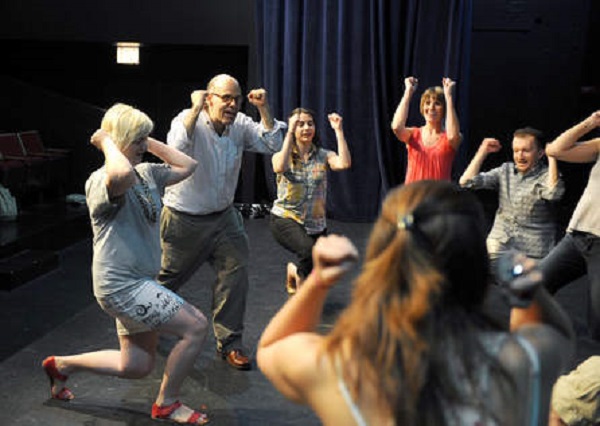Tips for Being a Better Improv Teacher (Part 1)

April 10, 2025
by
Jimmy Carrane
Improv teachers are like magicians. When you’re doing it right, it's pulling a rabbit out of a hat. While magicians never give away their secrets, improv teachers do, because they know they can't keep their skills if they don't give them away.
Recently I've been doing some reflecting on my career and what I've learned over all of my years of teaching improv, and I thought I would share with you some tips that I’ve learned over the years. But as I started writing this, I realized I had so many tips that they wouldn't fit into one blog. So here are my first 5 tips, and I'll share more with you next week.
- Teach Your Class Like You're Hosting a Party
The whole point of improv is to have fun, and the best way to teach this is by example. If the students aren't having a good time, chances are you aren't either. I know this because I have been there too many times to mention.
Norm Holly, who has taught at both Columbia College in Chicago and at Second City, is one of the best directors I've ever worked with. I’ve never seen someone say so little and get so much out of an actor.
Norm once gave me one of the best pieces of advice: "Teach your class like you're hosting a party."
This means something different for each of us. For me, it means I want people to have fun, feel comfortable and laugh a lot in class. To achieve this, I need to be enthusiastic and playful and not take myself too seriously.
You need to decide what this means for you, because as the teacher, you set the tone for the class.
It took me years to finally understand what Norm meant. Today, having fun in class comes more naturally, but I have spent a very long time “faking it until I made it,” which is another term for acting. - Meet Your Students Where They Are At
If you are willing to meet your students where they are at, you will become a more patient, understanding and compassionate teacher. If you don't, your students will resist and rebel, and everyone will be frustrated.
To do this takes requries a shift in perception. Instead of looking at teaching as correcting what you think your students are doing wrong, look at it as building on what they are doing right. If you think a student isn’t getting it, just lower your expectations, and remember that they will “get it” in their own time.
Jack was a student in one of my beginning-level slow improv classes. He was quiet and shy. He was invisible and he did not seem to be making any progress throughout the session. I was convinced after the first level that he was finished taking improv. I was wrong. To my surprise, he signed up for the next level, and by the end of the six-week class, he was one of the strongest improvisers in class.
I share this success because after all these years, I am still only right 50% of the time about who's going to "get it" or not, whatever that means.
Usually, when I “give up on a student" in my mind, that is when they start to make real progress. I think that’s because I stop being so rigid with my method and instead become more positive about the small things they do in class. - Don't Do It Alone. Ask for Help
Getting advice from other improv teachers is literally only a phone call away. The only thing preventing you from asking other improv teachers for help is a little fear and a lot of pride. I know the messages in your head, because I have had all of them. They usually go something like this: "I am a bother asking for help. I should be able to figure this out myself. They don't really know me that well."
Most improv teachers want to help. Actually they love to help. Why? Because it helps them.
When Covid hit in 2020, I was terrified to teach online. I thought I could never do it. I was pretty sure it was impossible. Kevin Reome not only spent over an hour on the phone with me coaching me through how to do it, but he even gave me his lesson plan and reassured me that I could do it. That was five years ago, and I am still teaching online, and it's all because I asked for help.
We all deserve to get support. It doesn't matter what the issue is — it could be with a student, or needing some new warm up games, or career advice — reaching out and getting expert advice always makes things easier.
Most of the time, when I call a fellow teacher and ask a question, I take their advice. And even when I don't, I still feel supported.
We are teaching others how to rely on other people, so we need to do the same ourselves.
If you live in the middle of the rain forest or some place that does not have improv teachers, start reaching out to teachers in other communities. If you can't find someone right away, you can always start with contacting me.
- Less Talking More Improvising
The more that students are actually improvising, the more they will learn. Teachers can be their own worst enemy by talking too much, using up valuable time that could be used for improvising. Improv is designed to be learned on your feet, not in your seat (do you like that one?), so be conscious of how much time you spend talking.
Most of the time it's more effective to have your class do a game or exercise that will illustrate your point instead of you talking about it.

